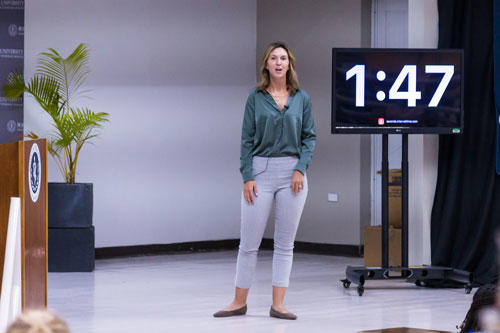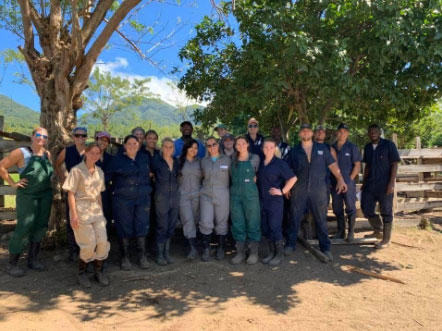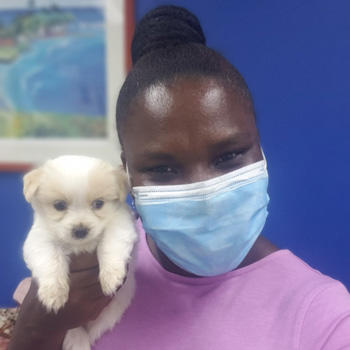According to the World Health Organization (WHO), new infectious diseases have emerged at the rate of one or more per year since the 1970s. SARS, HIV/AIDS, West Nile, and other diseases of zoonotic origin are well-known examples of this increase in disease threats[i].
From its inception, One Health, sometimes also called One Medicine, has been directed primarily by veterinary medicine leaders[ii]. The concept that animal health and the environment influence human health has been around since ancient times, and in fact, veterinary medicine was created to benefit human health by improving the food supply[iii].
As we have quickly shifted to response efforts for the novel coronavirus COVID-19 pandemic, Ross University School of Veterinary Medicine (RUSVM) engaged three of its current One Health program students in a conversation about what the program and its relevance considering the current public health situation.
Marshalette Smith Anthony is a nurse on St. Kitts. Melissa J Rash, DVM currently works for an animal diagnostic tools and software company. Christopher Tex, PhD, MPH is a professor in a Master of Population Health program.
How did you find out about our One Health program?
Marshalette: I work at Ross University School of Veterinary Medicine (RUSVM) in St. Kitts and each November for the past two years there has been a One Health Day activity, and it was at this activity that I learned about the program.
Melissa: I completed my Doctor of Veterinary Medicine (DVM) through Ross Vet in 2006 and then started in private practice before I moved to industry. I’ve been working in industry for a company that provides diagnostic tools, labs and consulting services, and practice management software, for the past six years and developed a professional network that led me to program. As crazy as it sounds, I wanted to study and learn again. When I found out about this program, I thought it would be something applicable that I could use in my position both at Ross Vet and in industry.
Christopher: In the fall of 2017, I began working at Chamberlain University (CU) as an associate professor of public health within the College of Health Professions’ Master of Public Health (MPH) program. I currently teach epidemiology, biostatistics, and research courses. Our MPH Director mentioned that this would be a great opportunity for me to obtain an MSc in One Health, as it could complement my extensive public health and animal handling experience.
What were you hoping to gain from our program?
Marshalette: I am hoping to gain a greater understanding of how such a program can contribute to policy development to improve the health of people, animals, and by extension our world.
Melissa: I’m hoping to gain enhanced knowledge that I can apply to my work and share with our profession to advance our thinking beyond the individual patient and owner in the exam room.
Christopher: I’m hoping to strengthen my scientific aptitude, as well as develop more networking and research opportunities between One Health and Public Health students and faculty.
How do you plan to use what you learned in your career OR how does One Health relate to your professional background?
Marshalette: I hope to have a better understanding of zoonosis, epidemiology, and the relatedness, so I can better identify issues and potential issues for the clients I have and the community I serve.
Melissa: My industry positions have allowed me to share information within my profession, allowing me to positively affect the human-animal bond from a different platform.
I think we have an opportunity, as veterinarians, to offer recommendations that go far beyond the pet and family in front of us in the exam room. I think large animal medicine does pretty well with this, for example, they look at herd immunity. In small animal medicine, we get away with focusing on the one dog in front of us and the people attached to it. I’d like to be a part of the progressive change and shift in mindset for the profession. I also see the opportunity for industry to be more relevant in One Health approaches
Christopher: The knowledge I’ll receive by obtaining the MSc in One Health will provide research and networking opportunities and we can increase interest in the importance of One Health initiatives by incorporating more discussions into our MPH curriculum. I’m also a member of the CU Interprofessional Education Case Studies Taskforce, which brings together students, professors, and researchers from multiple Adtalem institutions to strengthen teamwork skills in addressing health issues. By developing such academic and interprofessional opportunities for our students between academic institutions, we can strengthen the effectiveness of our networking capabilities to extend our reach globally in enhancing One Health initiatives.
You’ve been learning about One Health and now we have a firm example to draw on with a current pandemic. How has your understanding of One Health shifted?
Marshalette: For me, this pandemic has helped to cement the differences between the One Health approach and the Public Health approach to issues that affect the population. This pandemic has identified that a collaborative approach from different teams is needed to solve issues and develop plans to prevent the emergence and re-emergence of diseases.
Melissa: We’re seeing vector-borne diseases spread and then we’re seeing populations expand and travel in places where those kinds of issues weren’t necessarily prevalent. We need to address how one animal plays a part in the community, which is tied to public health education and how we communicate to the owners in terms of where some of these diseases originate from and precautionary measures related to it. We can be very short-term in our thinking, and need to communicate more on how people travel, what happens in other places, and what are the impacts of that.
I think there is still a need for defining One Health for the veterinary profession so that One Health becomes more than collaboration and evolves into systems approaches that can be developed and reused in multiple scenarios – reducing unnecessary expenditures and overlapping surveillance and improving efficiency.
Christopher: While I knew about the importance of One Health before entering the program due to my extensive experience volunteering in veterinary clinics, animal experience, and public health experience at various health departments, the numerous topics I’ve been learning more about informs my insight for further research opportunities regarding this current pandemic. For instance, the tiger at the New York Zoo, one of many, showing signs of COVID-19, tested positive during the ongoing pandemic. It is thought that an employee at the zoo infected the animals due to viral shedding. As such, this is the first time that such transmission has occurred in the United States, from human back to a non-human animal. This new phenomenon serves as a research opportunity for multisectoral leaders to address.
What lessons can be learned from the current public health situation?
Melissa: I live in Miami, Florida where we think a lot about natural disasters, and they seem to be getting worse every year. We have these wonderful rescue organizations and they’re going in and transporting animals to other places. But when we do that, are we thinking about the diseases that may come with the animal and the impact on the location we’re sending them to? I think it’s a great example of the benefit and need for systems approaches to be in place for crisis management. There are many examples of this, such as disaster preparedness and response, in which we could be working more efficiently if collaboration involved more comprehensive systems approaches.
I think we still have an opportunity to define One Health, at least for the veterinary profession. And right now, there’s a wonderful collaboration that’s happening during the pandemic. But is it developing a systems approach we can apply and use in the future? I think the systems development and approach for me, it’s the biggest lesson learned. From an interdisciplinary approach, how can we be more efficient? And how do we form that One Health team to collaborate?
Christopher: Transparency regarding communication and data sharing from multiple organizations and partners are important in reducing the spread of disease transmission. Furthermore, ensuring compliance with basic health hygiene techniques such as hand- washing and social distancing will also mitigate this pandemic.
ihttps://www.who.int/whr/2007/overview/en/index1.html
iihttps://www.ncbi.nlm.nih.gov/pmc/articles/PMC5644612/
iiihttps://www.amjmed.com/article/S0002-9343%2807%2901082-0/fulltext








